Peter Mullan Tyrannosaur
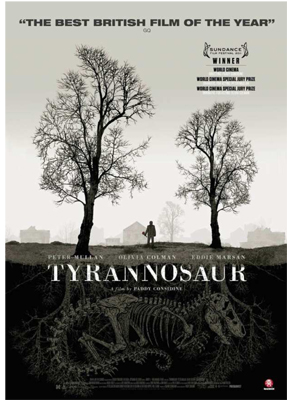
Tyrannosaur
Cast: Peter Mullan, Olivia Colman, Eddie MarsanDirector: Paddy Considine
Genre: Drama
Rated: MA
Running Time: 92 minutes
Synopsis: Joseph (Peter Mullan) is a man plagued by violence and a rage that is driving him to self-destruction. Hannah (Olivia Colman) is a worker at a charity shop, a respectable woman who appears wholesome and happy. When circumstance brings the pair together, Hannah appears as Joseph's guardian angel, tempering his fury and offering him warmth, kindness and acceptance. As their relationship develops, Hannah's own dark secrets are revealed and Joseph emerges as her potential unlikely saviour. With striking, award-winning performances and a deeply felt story, from the least likely of places.
Origins
Shot on in Leeds, UK, Tyrannosaur evolved from Considine's debut short film, Dog Altogether, released in 2007. The short, which filmed in Glasgow, opens with the character of Joseph (Peter Mullan), a man caught in the grip of his own anger, the short follows him through several violent scenes, in which he is both attacker and victim, up until the point where he meets a kind (Olivia Colman), outside a local charity shop, whose kindness seems to burn like a light in the dark.
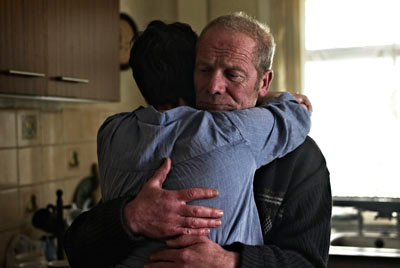 'The aim of Dog Altogether was to start a film with a man kicking a dog to death, and get an audience to end up caring about him' says Diarmid Scrimshaw, who produced both Dog Altogether and Tyrannosaur, 'Paddy Considine achieved that brilliantly. It was clear that Paddy Considine was an exceptional writer and director' Before shooting Dog Altogether, Paddy Considine had already co-written Dead Man's Shoes (in which he also stars), directed by his friend Shane Meadows, but felt that he had more to give. 'I've had some good moments as an actor,' begins Paddy Considine, who first attracted attention on screen with his performances in 1999's A Room for Romeo Brass, and then Last Resort, in the following year, 'but I knew I had to direct. I was becoming increasingly uncomfortable in front of the camera. I had the privilege to work with directors like Pawel Pawlikowski, Shane Meadows and James Marsh, who would consult with me about narrative. I knew I had a voice of my own and stories of my own that I needed to tell. "In my heart I knew I was a better writer director than I was an actor. The best coaches aren't always the best players. Filmmaking was an absolute necessity if I was to continue a career in this medium.'
'The aim of Dog Altogether was to start a film with a man kicking a dog to death, and get an audience to end up caring about him' says Diarmid Scrimshaw, who produced both Dog Altogether and Tyrannosaur, 'Paddy Considine achieved that brilliantly. It was clear that Paddy Considine was an exceptional writer and director' Before shooting Dog Altogether, Paddy Considine had already co-written Dead Man's Shoes (in which he also stars), directed by his friend Shane Meadows, but felt that he had more to give. 'I've had some good moments as an actor,' begins Paddy Considine, who first attracted attention on screen with his performances in 1999's A Room for Romeo Brass, and then Last Resort, in the following year, 'but I knew I had to direct. I was becoming increasingly uncomfortable in front of the camera. I had the privilege to work with directors like Pawel Pawlikowski, Shane Meadows and James Marsh, who would consult with me about narrative. I knew I had a voice of my own and stories of my own that I needed to tell. "In my heart I knew I was a better writer director than I was an actor. The best coaches aren't always the best players. Filmmaking was an absolute necessity if I was to continue a career in this medium.'This compunction led to Paddy Considine's short film, Dog Altogether, which won the Silver Lion at the Venice Film Festival, a BAFTA and a BIFA for Best Short Film. 'When making Dog Altogether, I had this character of Joseph that I knew very well and was very close to me, and close to my heart,' says Paddy Considine. 'And then the female character came from some research I was doing on My Summer of Love [the 2004 film in which he starred with Emily Blunt]. 'As I was doing my research, I found out about this charity shop, and how people would come in drunk and just vent their anger at the volunteers. One of the women would close the door and pray for them; a lot of the time she'd be afraid but she had this faith that overrode everything. She'd pray for these people and they'd come back day oftentimes quite sober and apologetic. That shop became like a haven, and she was the sort of person who attracted these kinds of people.'
Once he'd finished Dog Altogether, Paddy Considine began thinking more and more about his female character. 'People were curious about what happened to the characters,' he says. 'I think some watched the film and felt that it ended abruptly, as they were so involved in the story. With the short I wanted to know whether I could apply narrative to my ideas. I felt I'd accomplished short based on Olivia Colman's character and was geared in my mind to making that. I was flattered that people were so concerned about where the story could go, so it transformed into Tyrannosaur. I began to explore what was going on in Hannah's life.' So Paddy Considine began writing a second short film, focusing on the female character that helps Joseph, but then decided that he'd turn the story into his first feature film. 'I took myself away, and wrote what became Tyrannosaur in about a week and a half. I set about expanding the story and inventing a narrative for the two characters really. I sort of knew Joseph, and that's not to say he didn't surprise me, but I felt this need to find out about Hannah. 'I wanted to know what she living with. We all make assumptions about people and judge them on their appearance or what they have accumulated, or where they are in life. We are so indulged in our own lives that we fail to think for one second that the woman who serves you in the bank could be living in hell.'
The writer-director received support from many of the people who had worked on Dog Altogether, including both actors, Peter Mullan and Olivia Colman, and his producer Diarmid Scrimshaw, with whom Paddy Considine had worked earlier on in his career acting in a promo for The Arctic Monkeys'
Diarmid Scrimshaw says 'When I read Paddy's first draft of Tyrannosaur I knew we had a script that you could have started shooting there and then; it was that strong. It is one of those films that feels so gripping and true that it is destined to be made,' 'Lots of people come into filmmaking wanting to make powerful work that's affecting, emotionally true and honest, but few people get the chance to do that. This is a film that everyone involved has put their souls into.'
Themes
Tyrannosaur is a simple story about two lonely, damaged people struggling against life's vicissitudes, which then unfolds into a multi-faceted piece, probing at our perceptions of other people. 'What really affected me was the duality of pain,' continues Peter Mullan. 'On the one hand you have the more straightforward story of a man, Joseph, and his extreme anger, and then rather than just being a simple case of this woman, Hannah, that redeems him or shows him a better side to himself, it is a beautiful study of somebody who wanted to help everyone else but couldn't help herself, because she is in a such a horrendous situation with an abusive husband. Also, there's a real twist to it. I didn't see what was coming. It is beautiful character study, but also it is a really cinematic thriller.'
As the film opens, it is Peter Mullan's character that appears riddled with anger, and anguish, and it is his self-destructive journey that brings him into contact with Hannah, a kind, Christian, charity shop worker. Despite his belligerence, she extends the hand of friendship, and as their relationship develops, slowly at first, Joseph learns more about Hannah's life away from the shop. The shop, which first appears as a haven for Joseph, also proves a sanctuary for Hannah, cocooning her from the abuse she suffers at home at the hands of her husband, James (Eddie Marsan).
'When I read the script I took it as an allegory; It's about saving souls that's domestic abuse, social violence or a neighbour from hell - it's not a single issue piece,' continues Peter Mullan. 'It's about two souls who are adrift, confused and desperate to find some kind of solace, some kind of peace in their lives. Theirs is a spiritual connection - not necessarily religious - and a spiritual journey, about the connection of souls. There's this anger, the spirituality, the hope and the loss, and on a more grounded psychological level all the characters are trying to stay afloat in a variety of ways, and, ultimately, in very destructive ways.'
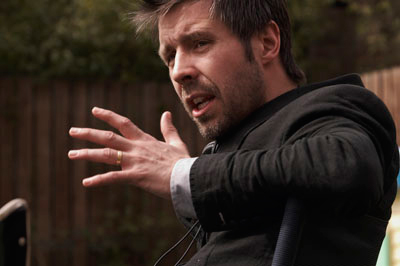 While the movie is an emotionally harrowing piece, it is not without its moments of levity, and even though both Joseph and Hannah suffer terribly, Tyrannosaur carries an air of optimism; despite their suffering, both characters find a sense of hope. 'That's very Paddy Considine, continues Peter Mullan. 'I don't think Paddy Considine is the kind of person, or the kind of filmmaker, to condemn these people to a life of never ending misery. He's an optimist by nature, so he wants to see how people come through situations like these. How do you come to terms with your own demons? There's a really tragic understanding that they both have of each other in the end, and that does give a sense of hope for both characters.'
While the movie is an emotionally harrowing piece, it is not without its moments of levity, and even though both Joseph and Hannah suffer terribly, Tyrannosaur carries an air of optimism; despite their suffering, both characters find a sense of hope. 'That's very Paddy Considine, continues Peter Mullan. 'I don't think Paddy Considine is the kind of person, or the kind of filmmaker, to condemn these people to a life of never ending misery. He's an optimist by nature, so he wants to see how people come through situations like these. How do you come to terms with your own demons? There's a really tragic understanding that they both have of each other in the end, and that does give a sense of hope for both characters.'Indeed, the writer-director himself states that for all the film's ferocity - violence, emotional cruelty and severe domestic abuse- the film is a simple love story. 'From the start I told everyone I was making a love story. I'm not interested in life being bleak. Yes, it's tough at times, and yes, it can be horrific, but there has to be hope. You don't get through life without hope. Well I wouldn't. 'These characters, despite their different backgrounds and circumstances are essentially the same. They are both willing to take up the knife. There is an unspoken bond between them, like they are soldiers who have a mutual understanding of each other's pain. You see it in ex-fighters. That's interesting to me. It's animalistic. They love each other by the end. They are bonded by a profoundly brutal act.' The brutality that unfolds on screen is affecting, but should not overshadow the characters' journey.
'I'm making a love story, and the brutality is secondary to these characters' stories,' continues Paddy Considine. 'I can't set out to write a film and say it's about anything in particular. I can't begin a script with a manifesto in mind. I can't say it's about alcoholism or domestic violence. Joseph drinks because it's become routine. It's become a part of his life. I actually think he's bored of it. Hannah drinks because it numbs her. It's a cushion so she can cope emotionally with her circumstances. 'I see people use domestic abuse as a sort of shorthand in films, and I hope Tyrannosaur doesn't do that. I know what occurs and I didn't want to abuse that. I didn't want to use the abuse as a device. It's such a tender subject, and it's affected a lot of people that I know. It didn't happen to me personally, but it happens way too much. Some of the things I've read are so grotesque you couldn't put them in Tyrannosaur. People wouldn't believe that it went on. It's a work of fiction but it happens, and women don't always have the support they need to get out.'
In terms of performance, the filmmakers agree that it is Olivia Colman, playing Hannah, who faces the biggest challenge as an actor, portraying a character that must wear a very different face in public from that which she wears at home. The actress says that the character is trapped in her relationship with husband James, a born-again Christian with terrible self-esteem issues. 'The domestic violence is a small part of the whole,' she says. 'Really Tyrannosaur is a story of humans surviving; if you're having a shitty time you can still find the good in people, and find the good in people and find hope. And I do think that it's a love story. It's strange, you'd never imagine Joseph and Hannah together, and they're not lovers at all, but they can't live without each other eventually. They're mutually supportive, and it's really rather sweet.'
As part of her research for the role, Olivia Colman spoke to support workers from the charity Refuge, which helps victims of domestic violence, 'and they said that with a lot of the abusers it is about a lack of self-esteem,' she explains, 'they want to exert power over somebody else. And when you're on the other end of that you lose your self-esteem, because you feel worthless and that you deserve it.' Olivia Colman, who delivers a stunning performance, goes on to note that some of the case studies that she read were truly harrowing. 'There was one extraordinary case study that they gave me,' she continues, 'and I wanted to do the situation and the story justice; I didn't want victims of abuse watching my performance and saying that it was ridiculous. So I took what information I could from the counsellors who dealt with people who are in that position; and some of the things I read, if you saw it in the film, you wouldn't believe it. Even though it's a powerful film, what Tyrannosaur shows is very mild compared to what some of these people have gone through. If these things that I read about were in a horror film you'd think it was far far-fetched.'
It is the character of James, Hannah's husband, played by Eddie Marsan, who is the prime perpetrator of the violence. 'What impressed me was the efficiency of the writing. It was a very sparse script,' says the multi-talented actor, who recently starred in Sherlock Holmes. 'With my character, James, the key thing is that people who are doing evil things often see themselves as victims. They don' consider themselves to be the villains, and that's how you play it. There are not a lot of words, and yet this very simple story gives us all these different avenues to explore, and that's the key for film writing: inviting the audience to think about their lives in a very profound way without overloading them. 'I think it's a film about existential angst,' Eddie Marsan concludes. 'Paddy Considine's brilliant at creating that; here are two people, Joseph and Hannah, trying to get through life in what sometimes seems an arbitrary and violent and chaotic world. The film is about people trying to overcome that. And I think Peter Mullan and Olivia Coleman's characters have this love affair that is very sweet.'
Characters and Cast
When Paddy Considine was writing Dog Altogether, he 'could only think of Peter Mullan' for the role of Joseph. 'Peter Mullan was my only choice, so much so, that I was willing to delay the film to wait for him. He has qualities that are hard to find these days. He belongs to the generation of actors that I love like Lee Marvin and Jack Nicholson. He's a cowboy. He could easily live alongside them. There isn't a moment where he isn't believable. He's charismatic and instinctive and he understood the animalistic qualities in Joseph as well as the subtleties. He carries much empathy. He's one of my favourite actors and there was nobody else on earth I wanted for the role.
While cinemagoers have become accustomed to strong performances from Peter Mullan, they are perhaps less familiar with Olivia Colman as a dramatic actress; she is best known for her TV comedy work on the likes of Peep Show, That Mitchell and Webb Look and Rev. 'I met her when we were making Hot Fuzz,' recalls Paddy Considine. 'I just had a feeling about her. She's very sincere and honest. I don't meet too many people that I instantly like, but she was one of them. She's only known for comedy in the UK. I suppose I saw a lot of myself in her too. I saw her in supporting roles and just felt she was being under used and it angered me. All I had were my instincts. She's never delivered a performance like this and I am proud of her. She punched above her weight. I saw her transform on this film. It was a remarkable thing to witness and I'm privileged to have been there.'
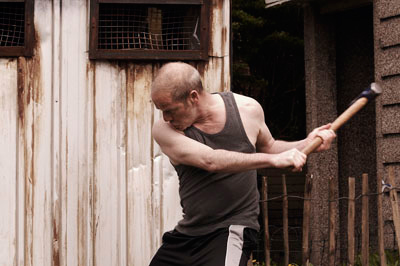 Olivia Colman recalls meeting Paddy Considine with particular fondness: 'When I first met Paddy Considine on Hot Fuzz, I was so excited I held the door open for him when he arrived and just smiled, like an idiot, and he said that at that moment he thought I could play Hannah, it was my smile!' She notes that she had never endured the pressures of such a challenging dramatic part. 'I was ever so nervous; I didn't want to let him down and do a poor job of it. All the way through I said, "If you need to go with someone else, I understand." But once Paddy Considine had made his loyal.'
Olivia Colman recalls meeting Paddy Considine with particular fondness: 'When I first met Paddy Considine on Hot Fuzz, I was so excited I held the door open for him when he arrived and just smiled, like an idiot, and he said that at that moment he thought I could play Hannah, it was my smile!' She notes that she had never endured the pressures of such a challenging dramatic part. 'I was ever so nervous; I didn't want to let him down and do a poor job of it. All the way through I said, "If you need to go with someone else, I understand." But once Paddy Considine had made his loyal.'Paddy Considine says 'Olivia Colman says very complementary things about me getting the performance out of her, but you've got to have it in you in the first place. I can't create it; I can't make someone a great actor. The beauty of her with no baggage. I could have cast other 'established' actors in the role, but you'd somehow know what you were getting. Olivia Colman is a total mystery, and she delivers.' 'I called her my fighter, and it was like a baptism of fire watching that girl on set. She became incredible, awesome, to me; she went up a level, and she became world class. People hear she's in the film and say that they think she's amazing, but they don't know how good she is, not until they've seen it.' Olivia Colman's co-star, Peter Mullan, concurs. 'She was beautiful to work with,' he smiles, 'and Olivia Colman had by far the most difficult part, because on the one hand she's playing someone who has a certain social face, that she has to put on, and then also has to keep her private misery behind that mask. That's a more difficult part than what Eddie Marsan and I had to do. To pitch that role is difficult, because on the one hand you've got to be someone who is a credible human being with a relatively straightforward life, but inside there's this terrific turmoil from the abuse she's suffering. I think she's astounding.'
The actress says that she is delighted with the film. 'Paddy Considine was the one who gave me the chance to have a crack at serious drama, and I'm so grateful. In fact,' she laughs, 'I'm quite grateful I didn't have to audition for the part in Tyrannosaur, having done the short, because I probably wouldn't have got it! Really, though, Paddy Considine had such an incredible empathy. He was always there, watching and whispering to you. I think he could get a good performance out of anything, and of course I had wonderful people to work with, like Peter Mullan and, Eddie Marsan.'
Eddie Marsan takes the main supporting role in the film, that of Hannah's husband, James. 'You meet Hannah and think she's got this perfect marriage and this perfect husband, but he's a control freak, an abusive husband,' explains the actor. 'He's a very frightened man; he tries to control his demons by controlling his wife, and he beats her.' Eddie Marsan and Paddy Considine had a strong mutual respect. The duo had met briefly when shooting the TV series Red Riding. 'Eddie Marsan is someone who I've been aware of for years,' notes Paddy Considine. 'He's one of our best. To play the role of James is a tricky balancing act, but he got it. He play which is what he is, as opposed to some villain. Olivia Coleman had to feel safe with him and she did. He's a great actor and a lovely man who knows the art and can turn it on and off. He went to some tough places, dark places. He's class'.
Style
Long before he became an actor, and then a director, Paddy Considine studied photography, earning a first class degree from college in Brighton, and he always harboured ambitions of stepping behind the camera. With his first feature film unfolding on a British council-estate, however he did not want to go down the path of quasi-documentary realism.
' Films from the UK set on a council estates tend to be populated with drug dealers, prostitutes and people with guns' notes Tyrannosaur producer Diarmind Scrimshaw.
'Council estates are painted as these hellholes rife with criminality, but I've lived in council housing, Eddie Marsan grew up on a council estate, Paddy Considine grew up in that environment too and 95% of people you meet are just normal people who care about where they live and want what's best for their families and friends like everyone else. For some reason it's just the other 5% that people 'fetishize' in the filmmaking world; our film doesn't do that at all. It's sees the connections that happen between real people every day, our characters find hope and friendship from pain' Diarmind Scrimshaw points to a scene in the film at a wake for one of Joseph's friends. 'You see the scene at the wake and you want to be part of that world, you want to be in that community, celebrating life's ups and downs. The most shocking moments of the film don't happen in a council estate, things are not always what you'd presume.'
'This is a work of cinema', continues the producer. 'A lot of those 'council estate-chic' films have that documentary-style, wobbly camera, trying to look 'authentic', and Paddy Considine's done the opposite. Him, and our brilliant DoP Erik Wilson, have given us these beautifully composed 2.35 ratio shots that look very cinematic.' Paddy Considine says that he wanted his film to have the same sense of space, and stillness, that is found in many classic Westerns with beautifully composed, expansive shots. 'The handheld aesthetic has been done to death, particularly in social realist dramas. I'm not a social realist. I wanted to make cinema. You can't set a film on a housing estate without giving it a documentary feel. I was anti-that. I didn't want improvisations either. The cast throw an ad-lib in here and there, but they are small moments and are welcome because they are well judged. 'For me performance was everything. I wanted them to feel secure. I think the space is very important. You should earn your moments as a viewer, and I think if you stick with the film you are rewarded in some way. To me they are beautiful and heroic and I think the framing respects that.'
He points to a film in which he starred early in his career, The Last Resort, directed by Pawel Pawlikowski. 'Pawel Pawlikowski shot handheld beautifully, but then it became bastardised by loads of stipulations when I was planning on the film was that I was making a movie. We wrap ourselves in barbed wire with the films we make in this country, we sort of limit ourselves. I adopted the mindset that I wasn't making a 'little British film'. Even though only had a small budget, I wanted to make a movie that felt big. If not in scale, then at least with moments'
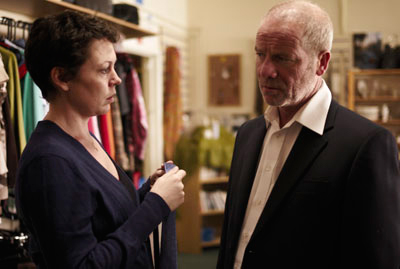 According to Peter Mullan, who also has experience behind the camera, having directed the likes of Orphans, The Magdalene Sisters and Neds, Paddy Considine succeeds. 'Paddy Considine was very anxious not to go down the hand-held road,' explained Peter Mullan. 'He wanted it to be a quite classical kind of film. We have a lot of similar influences - Paddy Considine is a big film buff - and neither of us are into this nouveau social realism.
According to Peter Mullan, who also has experience behind the camera, having directed the likes of Orphans, The Magdalene Sisters and Neds, Paddy Considine succeeds. 'Paddy Considine was very anxious not to go down the hand-held road,' explained Peter Mullan. 'He wanted it to be a quite classical kind of film. We have a lot of similar influences - Paddy Considine is a big film buff - and neither of us are into this nouveau social realism.When I make films I like the idea of a big screen and allowing the audience, through stillness, to get to know people.' Paddy Considine's decision ensures that the film carries a striking aesthetic, and his acppreciate the space in which they could find their performance. 'I love it when films give you some space, as an actor, and as an audience member,' says Olivia Colman. 'There's this neurosis among people, filling things with music, action, a crane shot, panicking about not having enough in it, and I love that Paddy Considine doesn't worry about all that. There are moments of everyone's day when nothing is said, everything is normal, and it gives the audience more time to wonder what's going on in their heads. It's just another wonderful aspect of a really, really special film.' The writer-director concludes: 'I wish I'd done this ten years ago. It's been the most profound move I've ever made. Regardless of how it's received, I've found the thing I'm best at.' Few who see Tyrannosaur will disagree.
MORE
- Mission: Impossible Fallout
- Glenn Close The Wife
- Allison Chhorn Stanley's Mouth Interview
- Benicio Del Toro Sicario: Day of the Soldado
- Dame Judi Dench Tea With The Dames
- Sandra Bullock Ocean's 8
- Chris Pratt Jurassic World: Fallen Kingdom
- Claudia Sangiorgi Dalimore and Michelle Grace...
- Rachel McAdams Disobedience Interview
- Sebastián Lelio and Alessandro Nivola...
- Perri Cummings Trench Interview



